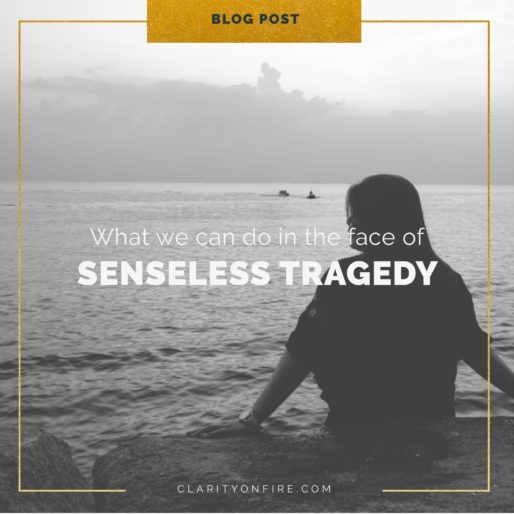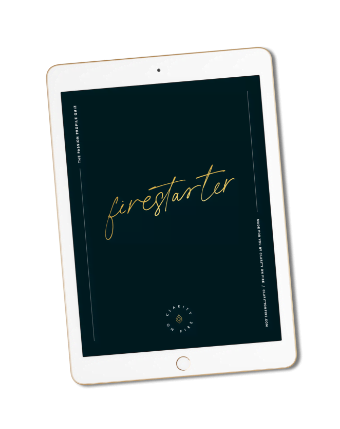This past weekend my mom and I were driving down a two-lane back road in North Carolina, on our way to the beach, with my dog in the backseat.
Seemingly out of nowhere, we encountered every pet owner’s worst nightmare — two big dogs running in the grass alongside the road, with cars coming in both directions.
I wanted to stop and help them, but I didn’t know how.
I couldn’t have put them in my car — not with my own dog already in the back, and maybe not even then. They were most likely local dogs that had escaped from their yard … but what if they weren’t? They could have been aggressive or even rabid.
And my stopping could have harmed them more – they were on the opposite side of the road, and if I’d stopped, they might have run across to greet me and gotten hit by oncoming traffic.
Powerless to do anything actually helpful, we did the only thing we could think of in that moment. We slowed down and made sure the cars around us had seen them, too.
Later, I told myself the things we all tell ourselves in moments like those:
“It’s OK, someone more capable probably stopped for them.”
“You aren’t from around here. You didn’t even know exactly where you were! What would you have done with them once you had them in the car?”
“They’ll be fine. It’s a small town. I’m sure someone local recognized them and knew who to call.”
And maybe that’s true … or maybe I’m kidding myself.
On the heels of that experience, and in the wake of all the violent and senseless tragedy going on in my country (and the world at large) lately, I’ve been facing some hard truths about what I’m doing — and not doing — to make a difference.
And as it turns out, I’m kind of a hypocrite.
LATER THAT DAY …
A few hours later (because the Universe loves to make its point), another weird thing happened.
I got a voicemail from a very-old-sounding man, calling to wish his granddaughter Megan a happy birthday.
Clearly he had the wrong number, or he misdialed, or he’s a bit senile … because I’m definitely not Megan.
It seemed insignificant, so I didn’t call him back. Again, I thought what most of us would be thinking:
“That’s awkward … I’ll just let it go.”
“What if I call him back and he’s super confused?”
“Or what if I call back and get roped into an hour-long conversation with a crazy person? I don’t have time for that.”
So I didn’t call him back.
It probably wouldn’t have taken an hour. I could have cleared up his confusion and at least not allowed him to think that his granddaughter didn’t care about returning his call.
But I shrugged off my guilt and moved on.
AND THEN … THERE ARE THE BIGGER THINGS
I know I’m not alone in this. How many times have we all made excuses not to do as much as we rightfully could because it was awkward or inconvenient or difficult?
And pardonable as both of these relatively small incidents might be, it only makes me think about the ways in which I — and all of us — are hypocritical when it comes to what we say we believe in, versus what we’re actually willing to do …
- How many of us complain about the candidates for president, but don’t vote in primary elections? I haven’t always voted.
- How many of us who desire stricter gun control laws actually call our representatives in congress to tell them what we think? I’ve never called.
- How many of us want policy changes, but don’t take an interest in local and state elections … allowing people who likely don’t share our views to make decisions on our behalf? I’m guilty.
- How many of us mute those heart-wrenching animal welfare commercials because they’re too hard to watch, but never actually volunteer at a shelter or donate to their cause? I’ve donated, but only rarely.
- How many of us refuse to even make eye contact with homeless people, out of fear and shame? For every homeless person I’ve helped, there are scores of people I’ve ignored.
I see an uncomfortable trend among a lot of people — myself included:
We’re quick to complain about injustice. We easily express our indignation and our outrage about wrongs that need to be righted. We talk amongst ourselves about everything that needs changing. We post sentimental quotes on Instagram to show our moral support in the wake of tragedy.
But talk, and Instagram pictures, are cheap. When it comes down to it, most of us aren’t very good at backing up what we say we believe in with real action.
I’m not trying to shame myself, or any of us.
I get how difficult this is. There are so many problems and so many causes. You can’t give your time and money and energy to every cause that’s worthy; you’d collapse under the weight of that responsibility.
In the face of senseless violence, mass murder, uncontrollable disease, child abuse, poverty, homelessness, animal abuse, terrorism, racism, climate change, and everything else …
… it feels so difficult to do anything that we end up doing nothing.
WHAT WE CAN DO TO MAKE THINGS BETTER
I think the biggest mistake we’ve all been making is to presume that our individual effort isn’t enough to change anything.
Margaret Mead once said, “Never doubt that a small group of thoughtful, committed citizens can change the world; indeed, it’s the only thing that ever has.”
So, here are a few ideas for how we, the people reading this — who definitely count as a relatively small group of thoughtful citizens — can make an impact on the world in unexpected ways that still have a HUGE ripple effect:
Stop living according to the “bystander” mentality: If everyone who passes by says, “Surely someone else will deal with that,” then no one will. Don’t forfeit your power to make a difference by presuming someone else will do it for you.
I may not have been able to put those two dogs in my car, but in hindsight, I could have tried to Google a local animal control agency and given them a report of my sighting.
Put your phone down: We’re devastated by acts — like senseless violence and mass murder — that are void of empathy and compassion and humanity, and yet, we’re completely addicted to devices that keep us from having to physically interact and empathize with other living, breathing human beings.
We walk around with our heads in our phones. We sit in lobbies, waiting rooms, restaurants, trains … and never make eye contact with another person. And then we wonder where the humanity has gone and why people are so desensitized?
Our addiction to our devices keeps us locked away in our own worlds. It enhances our self-absorption. It makes us blind to what’s going on around us. And it makes it easier to forget that what’s done to one of us is done to all of us.
Putting your phone down and really being there with people, even people you don’t know, honors their dignity as human beings.
Vote for what you believe in through your lifestyle: I’m not just talking about actual voting (as in, elections), though that’s obviously critical, but “voting” through the way you live your life.
If you dislike how negative the news is, don’t give them ratings or page views by engaging with their content.
If you want fair wages for people working menial jobs, don’t shop at big-box corporate stores and retailers. Vote with your money by shopping elsewhere.
If you wish the world were a more compassionate place, be open to small opportunities to extend your compassion to people you interact with on a daily basis.
WHEN IT COMES DOWN TO IT …
Most of us are only going to have a few chances in our entire lifetime to do something really, hugely, deeply critical or heroic for the world or our community.
For the vast majority of us, it’s this stuff — choosing not to be a bystander, putting our phones down, being empathetic, spending our money with integrity, voting in every election, calling our representatives, choosing to do what’s right instead of what’s comfortable — that has the biggest ripple effect.
Not to sound dramatic, but …
![]() The fate of the world matters way too much for good people to remain passive.
The fate of the world matters way too much for good people to remain passive.
Being harmlessly hypocritical isn’t so harmless these days. And personally … I’m no longer OK with being that way.
How about you? Share with me, in the comments.
TOO LONG, DIDN’T READ? LISTEN INSTEAD!
If reading long blogs just isn’t your deal, you’re in luck:
We’ve started recording our blogs for you!
Here’s Rachel reading this week’s blog:
Much Love,
Rachel (+ Kristen)




Inspiring message. I’m definitely in the same hypocritical camp a lot of the time. I know I would have reacted the same way if I’d come across dogs like that. Bystander mentality is so easy to succome to, but ever since I’ve learned about it I try not to let it rule me when circumstances allow.
I’m more of an audio-book/kindle addict than with my phone, but it’s true that it leads to shutting off socialization and ignoring immediate surroundings. I have been making a conscious effort to engage in the world more. In fact, I’ve made friends with a person I see at the busstop fairly often in that way, and it turns out she is a role model. Not just a good person, considerate and charitable, but a genuinely good citizen, engaged in many religious and civic groups. She shows up at local government meetings and committees, and speaks for her beliefs and stands up for the benefit of the community. I am so glad to have met her! It really does go to show that the smallest things can and do matter!
I LOVE this story, Jen! You making friends with the woman at the bus stop is the exact kind of thing that can happen when you’re willing to engage with the world a little more, and just *look up.* Thank you for sharing that! 🙂
Yes to all of this! A few years ago, I decided to smile at strangers instead of look away when we made eye contact. No one ever looks away… they always smile back. It’s the simplest expression of connection and it’s SO effective. So much of the fear going on is because we think we’re surrounded by strangers, but it doesn’t have to be that way if we put our phones down and engage with people.
I’m also speaking my mind more often when I hear others making insensitive comments. The complaint that we’re “too PC” these days, is really a complaint about having to think about the feelings of those who have been marginalized for all of history. I think we should all embrace moving towards a more aware and compassionate mindset 🙂
I’ve tried to do the smiling thing more often, too! And I’ve had the same experience … no one is weirded out. Strangers aren’t actually *strange* … they’re by and large just other humans, with feelings, who feel good to be acknowledged. Glad you’re doing that, Stefanie!
It’s so weird you blogged about this!!! A couple days ago I stopped at a gas station to use the restroom and before I got out of the car, I noticed there was a gentleman standing outside asking for money. I actually left to go to another gas station because … because I don’t even know why now! I felt/ still feel so stupid. And, I even was trying to get better about handling these kinds of situations and make sure I always have money on me. But, a concern I frequently have is that they will use the money for… not food or gas. If I was worried about that though I should offered to buy him something in the store. This post was the full on kick in the pants that I needed to stop making dumb excuses when it comes to helping people. Because in the end, not helping is always the wrong decision.
Beautiful job Rachel, beautiful job.
Thanks for sharing that story, Jessica! It’s really powerful. You know, Brene Brown (the bestselling author and speaker) purposefully carries these packages in her car for just that purpose — giving to homeless people who need help, but whom she doesn’t want to hand out money to. The packages have things like gatorade and protein bars and crackers and water and that kind of thing in them. I LOVED that idea! So much more useful to the average person than a few bucks.
Great reminder!
It can be overwhelming to think about solving all of the problems in the world.
I don’t have to do it all, but I can do something.
The small things do add up.